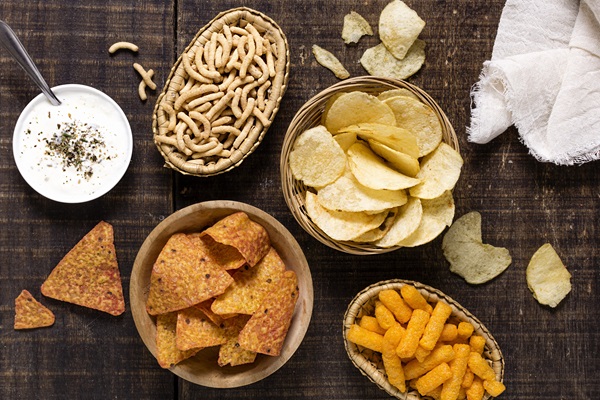In a world where convenience often takes precedence, processed foods have become a ubiquitous presence in our diets. These foods undergo a series of industrial procedures, transforming their original state to enhance shelf life, taste, and texture. While they may be convenient, these heavily processed foods come with significant risks. This article dives deep into the risks of processed foods, shedding light on the various health issues they can trigger.

The Risks of Processed Foods
A. The Impact of Added Sugar
Unhealthy Sugar Levels
One of the primary concerns with the risks of processed foods is their astonishingly high sugar content. Added sugar not only enhances taste but also hooks our taste buds, making it hard to resist these sugary treats.
Obesity Epidemic
Excessive sugar in processed foods has been closely linked to the obesity epidemic. Excess sugar is converted into fat by the body, leading to weight gain.
Insulin Resistance
High sugar intake can result in insulin resistance, a precursor to type 2 diabetes. The body’s ability to regulate blood sugar is compromised, increasing the risk of diabetes.
B. Sodium Overload
Excessive Salt
Processed foods are notorious for their sky-high salt content. Sodium, while necessary for bodily functions, can be detrimental when consumed in excess.
Elevated Blood Pressure
A diet rich in sodium can lead to hypertension. This, in turn, raises the risk of heart disease and stroke.
Kidney Strain
The kidneys bear the brunt of excessive sodium intake. Over time, this can lead to kidney damage or dysfunction.

C. Fat: The Silent Culprit
Unhealthy Fats
Processed foods often contain unhealthy trans fats and saturated fats. These fats are associated with a multitude of health issues.
Cardiovascular Consequences
Consuming trans fats raises LDL (bad) cholesterol levels, increasing the risk of heart disease and stroke.
The Double-Edged Sword of Saturated Fats
Saturated fats are one of the risks of processed foods that can both raise LDL cholesterol and reduce HDL (good) cholesterol, compounding heart disease risk.
D. Nutt Depletionrien
Processing and Nutrient Loss
The extensive processing of foods can strip them of essential nutrients, leaving behind empty calories.
Microbial Impact
Other risks of processed foods may also harm the gut microbiome, which plays a pivotal role in overall health.
The Health Toll
Nutrient-poor diets can lead to various deficiencies and health problems in the long run.
E. Ultra-Processed Foods and Metabolism
The Ultra-Processing Effect
Ultra-processed foods undergo an extreme level of processing, which has far-reaching effects on our health.
Altering Satiety
These foods disrupt our body’s natural hunger cues, often leading to overeating and weight gain.
Glycemic Response Disruption
Ultra-processed foods can lead to rapid spikes in blood sugar levels, straining the body’s glycemic control.

F. The Unseen Chemicals
Chemical Additives
Processed foods are loaded with artificial additives and preservatives, many of which are of dubious safety.
The Role of Additives
Some additives are known to trigger allergic reactions, while others may disrupt hormone regulation.
Food Dyes and Behavior
Research has suggested that artificial food dyes in processed foods may lead to behavioral problems in children.
G. The Path to Cardiometabolic Disorders
Hidden Triggers
Several substances formed during the ultra-processing of foods have been linked to the onset and progression of cardiometabolic disorders.
The Glycemic Impact
Ultra-processed foods can cause rapid blood sugar fluctuations, a risk factor for diabetes and heart issues.
A Multi-Pronged Threat
The metabolic and cardiovascular effects of ultra-processed foods pose a substantial health threat.
H. Strategies for a Healthier Diet
The Real Food Alternative
Choosing whole, unprocessed foods is the first step toward a healthier diet.
Home Cooking
Cooking at home allows for control over ingredients and helps reduce reliance on processed foods.
Reading Labels
Becoming an informed consumer means scrutinizing food labels for hidden sugars, sodium, and unhealthy fats.
Moderation and Awareness
Indulging in processed foods occasionally, while being mindful of their health implications, is a balanced approach.
Conclusion
The allure of processed foods lies in their convenience and taste, but beneath this seductive exterior lies a lurking health menace. High sugar, sodium, and unhealthy fats in processed foods can lead to a range of health issues, from obesity to heart disease and diabetes. Furthermore, ultra-processed foods disrupt our metabolism and may trigger cardiometabolic disorders. As consumers, it’s crucial to be informed and make deliberate choices for a healthier, less processed diet. The risks of processed foods are real; understanding them is the first step towards a healthier, more vibrant life.




